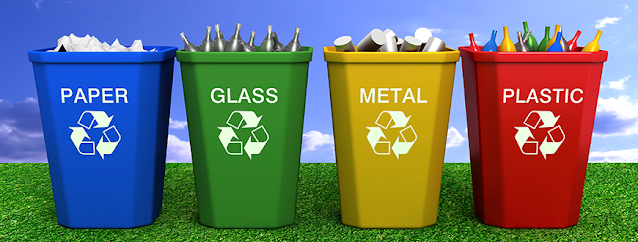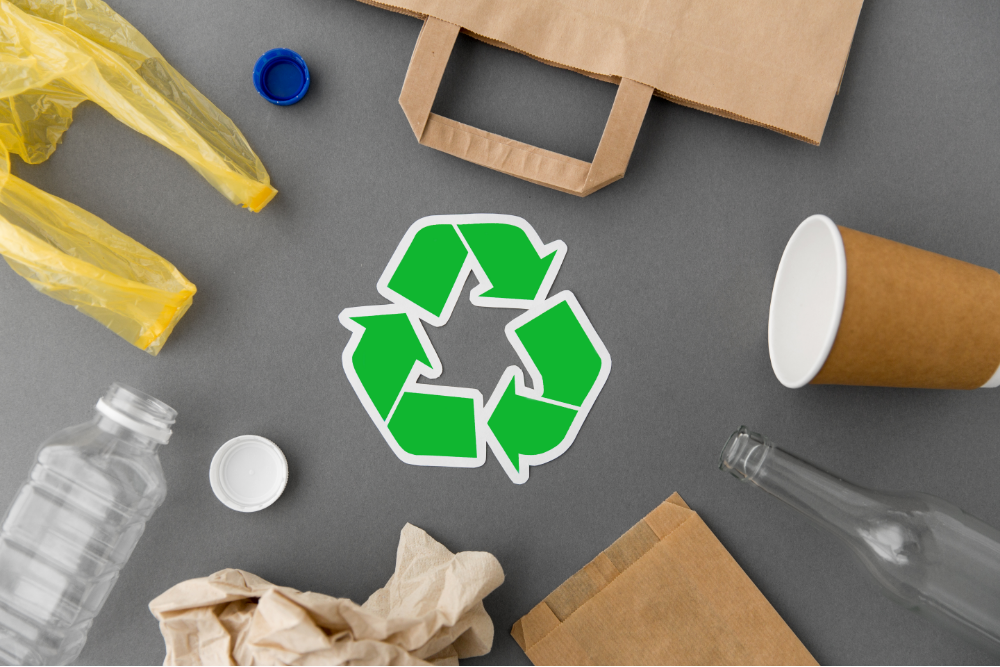Don’t be discouraged by the seemingly complex solutions for climate change. The power to make a real difference starts right at home with recycling and reusing at home. These simple practices significantly reduce our environmental impact and pave the way for a more sustainable future.
The Recycling & Reuse Ripple Effect:
Recycling and reusing have a ripple effect that extends far beyond your doorstep. Here’s how:
Reduced Greenhouse Gas Emissions:
Manufacturing new products from scratch uses significant energy, leading to greenhouse gas emissions. Recycling existing materials lowers this energy demand, reducing our carbon footprint.
Conservation of Natural Resources:
Recycling conserves precious resources like trees, water, and metals. For example, recycling one aluminum can save enough energy to power a television for three hours!
Less Waste in Landfills:
Landfills are overflowing with our discards. Recycling diverts tons of waste from landfills, extending their lifespan and preventing environmental contamination.

Your Role in the Recycling & Reuse Revolution:
You might wonder “How much of a difference can I make?” The truth is, every little bit counts! Here’s how you can become a recycling and reuse champion in your daily life:
Classic Recycling:
Sort your recyclables: Familiarize yourself with local recycling guidelines and separate items accordingly. Common recyclables include paper, cardboard, plastic bottles and containers (check recycling symbols), metal cans, and glass bottles.
Reduce contamination: Rinsing food containers and collapsing cardboard boxes ensures they’re clean and ready for processing.
Compost food scraps: Food and yard waste take up valuable space in landfills but decompose beautifully in a compost bin. Composted material creates nutrient-rich soil for your garden!
Creative Reusing:
Repurpose old items: Give new life to old clothes by turning them into cleaning cloths, tote bags, or even pet toys.
Get crafty: Use empty glass jars for storage, turn old magazines into collages, or transform plastic bottles into planters.
Shop secondhand:
Extend the life cycle of clothing, furniture, and household goods by shopping at thrift stores or garage sales.
Tech to the Rescue: Recycling & Reuse Innovation
Technology is making recycling and reusing even easier and more efficient. Here are some innovative solutions for home use:
Smart Recycling Bins: These bins can sort recyclables automatically, eliminating sorting confusion and contamination.
3D Printing with Recycled Materials: New 3D printers allow you to create objects using recycled plastic filament, reducing reliance on virgin materials.
Online Marketplaces for Reusables: Apps and websites connect people who have unwanted items with those who can give them a second life.
Embrace the Change, Embrace a Sustainable Future:
Recycling and reusing are simple yet powerful actions that contribute to a healthier planet. By incorporating these practices into your daily routine, you’re not just decluttering your home – you’re taking a stand for a more sustainable future. Remember, every recycled bottle, reused container, and reimagined item is a step towards a greener tomorrow.
Let’s get started! Together, we can create a ripple effect of positive change.
Beyond Recycling: Composting and Innovative Tools for a Circular Economy at Home
Recycling and reusing are foundational practices for a sustainable future, but there’s more we can do! Let’s explore innovative tools and technologies that can further reduce waste and transform what we discard into valuable resources.
From Kitchen Scraps to Fertile Soil: Composting
Food scraps and yard waste make up a significant portion of landfill content. Composting offers a natural solution, turning these discards into nutrient-rich soil amendments for your garden.
- Traditional Composting Bins: These outdoor bins provide a simple yet effective way to break down organic matter through natural decomposition.
- Electric Composters: For indoor convenience, electric composters use heat and agitation to accelerate the composting process.
- Bokashi Composting: This anaerobic fermentation method breaks down food scraps quickly in a sealed container, perfect for limited space.
Innovation Breeds Progress: Tools for a Circular Home
Technology is revolutionizing how we manage waste at home. Here are some exciting advancements:
- Food Waste Digesters: These countertop appliances convert food scraps into bio-slurry for disposal or potential use as fertilizer (check local regulations).
- Smart Appliances with Waste Reduction Features: New dishwashers and washing machines boast settings that optimize water usage and minimize detergent waste.
- Automated Sorting Systems: While still in development, automated sorting systems for the home could eliminate sorting confusion and streamline the recycling process.
The Call to Action: Innovate, Collaborate, and Champion Change by Recycling and Reusing at Home
The possibilities for a more circular home economy are endless. Consumers can drive innovation by demanding sustainable products and supporting companies that prioritize responsible waste management. Inventors and entrepreneurs have a role to play in developing user-friendly tools that make recycling and reuse effortless.
Here’s how you can get involved:
- Research and invest in innovative recycling and composting solutions.
- Support companies committed to sustainable practices.
- Share your experiences and inspire others to embrace a circular lifestyle.
- Encourage collaboration between households, communities, and policymakers to develop comprehensive waste management solutions.
Remember, innovation thrives on a foundation of awareness and action. By embracing these tools and technologies, we can move beyond simply managing waste and create a future where resources are continuously cycled and reused, minimizing environmental impact and fostering a more sustainable world.
Let’s turn our homes into hubs of innovation! Together, we can rewrite the narrative on waste and build a circular economy that benefits our planet and future generations.
Source : https://www.epa.gov/recycle
1degrhttps://1degreee.com/ee

